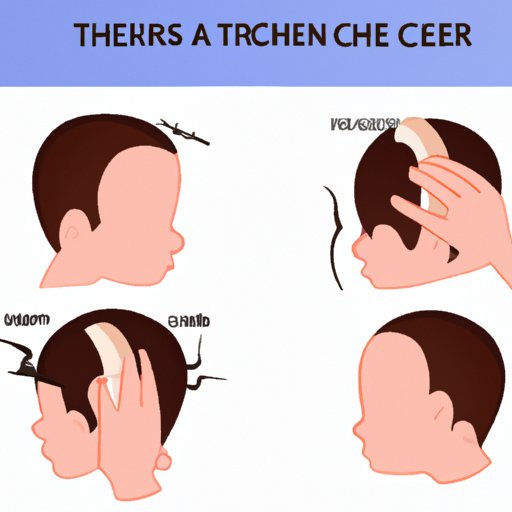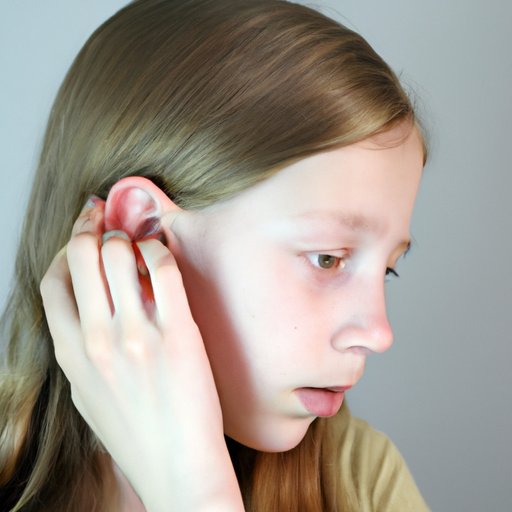Introduction
Many of us have experienced the discomfort of itchy ears. It can be an annoying and distracting sensation that can be difficult to ignore. Itchy ears can be caused by a variety of factors and can range in severity from mild to severe. In this article, we will explore the possible causes of itchy ears, when to see a doctor, home remedies for mild cases, and prevention tips. We will also examine the link between hearing loss and itchy ears, ear infections and itchy ears, and how to treat itchy ears in children.

Possible Causes of Itchy Ears: Understanding the Root of the Problem
There are several common causes of itchy ears, including:
Allergies
Allergies can cause inflammation and irritation in the ear canal, leading to itchiness. Common allergens include pollen, mold, pet dander, and dust mites.
Dry Skin
The ear canal can become dry due to low humidity, exposure to dry air, or using earplugs or hearing aids. Dry skin can cause itching and discomfort.
Earwax Buildup
Earwax is a natural substance that helps protect the ear canal from dirt, dust, and bacteria. However, excess earwax can accumulate and block the ear canal, leading to itching, irritation, and even mild hearing loss.
Skin Conditions
Conditions like psoriasis or eczema can affect the skin in and around the ear canal, causing redness, itching, and flaking.
Fungal or Bacterial Infections
Fungal or bacterial infections can occur in the outer or middle ear and cause itching, pain, and discharge. These infections may be more common in people with weakened immune systems, swimmers, or those who live in humid environments.
When to See a Doctor for Itchy Ears: Identifying Serious Conditions
While most cases of itchy ears are mild and easily treated, some symptoms may indicate a more serious condition that requires medical attention. Red flags include:
Severe Pain
If you experience severe or sharp pain in your ear, it may be a sign of an infection or injury.
Bleeding or Discharge
If you notice any bleeding or discharge from your ear, it may be a sign of a ruptured eardrum or infection.
Loss of Hearing
If you experience a sudden or gradual loss of hearing, it may be a sign of damage to the inner ear or a more serious medical condition.
Swelling or Lumps
If you notice any swelling or lumps around the ears, it may be a sign of infection or a growth that requires medical attention.
If you experience any of these symptoms, it is important to see a doctor for proper diagnosis and treatment.
Home Remedies for Itchy Ears: Easy Solutions for Mild Discomfort
For milder cases of itchy ears, there are several home remedies that may provide relief:
Warm Compresses
Placing a warm, damp towel or washcloth over the affected ear can help soothe and relieve itchiness.
Mineral Oil or Olive Oil Drops
Dripping a few drops of mineral oil or olive oil into the ear canal can help soften earwax and alleviate dryness.
Over-the-Counter Antifungal Creams or Ear Drops
If the itching is caused by a fungal or bacterial infection, your doctor may recommend over-the-counter antifungal creams or ear drops to treat the infection.
Avoiding Irritants or Allergens
Avoiding exposure to irritants or allergens that can trigger itchy ears, such as cigarette smoke, hair products, or rough fabrics, can help prevent further irritation.
When applying remedies to the ear, it is important to do so safely and effectively. Never insert anything into the ear canal, as this can cause damage or further irritation.
The Link Between Hearing Loss and Itchy Ears: What You Need to Know
Hearing loss can be related to itchy ears or vice versa, as both can be symptoms of underlying conditions. Some common causes of hearing loss include:
Noise Exposure
Prolonged exposure to loud noises can damage the hair cells in the inner ear, resulting in hearing loss and tinnitus (ringing in the ears).
Aging
As we age, the hair cells in the inner ear naturally deteriorate, leading to gradual hearing loss.
Medications
Some medications, such as certain antibiotics and chemotherapy drugs, can cause hearing loss as a side effect.
If you are experiencing hearing loss or itchy ears, it is important to see a doctor for proper diagnosis and treatment.
Prevention Tips for Itchy Ears: How to Avoid Future Ear Irritation
There are several ways to prevent itchy ears, including:
Cleaning Ears Properly and Regularly
Clean your ears regularly with a damp cloth, but avoid using cotton swabs or other objects that can push earwax further into the ear canal.
Avoiding Exposure to Water or Irritants
Avoid exposure to water or irritants that can cause itching or inflammation, such as chlorinated pools or hair products.
Keeping Ears Dry and Moisturized
Dry your ears thoroughly after showering or swimming and use a moisturizing lotion or oil to prevent dryness.
Maintaining Good Ear Hygiene
Practice good ear hygiene by avoiding habits like smoking or wearing earplugs for extended periods of time.
By adjusting your habits and lifestyle, you can help prevent future episodes of itchy ears.
Ear Infections and Itchy Ears: Are They Linked?
Ear infections can cause itchy ears, and vice versa. Some common types of ear infections include:
Otitis Externa
Also known as swimmer’s ear, otitis externa is an infection of the outer ear canal that can cause itching, redness, and discharge.
Otitis Media
Otitis media is an infection in the middle ear that can cause pain, itching, and fluid buildup.
To prevent ear infections and their associated symptoms, maintain good ear hygiene and avoid extended exposure to water or irritants.
Treating Itchy Ears in Children: Common Causes and Effective Solutions
Children may experience itchy ears due to a variety of causes, including:
Ear Infections
Ear infections are a common cause of itchy ears in children and may require medical treatment, such as antibiotics.
Allergies or Eczema
Children with allergies or eczema may experience itchy, dry skin in and around the ear canal.
Foreign Objects in the Ear
Children who stick objects in their ear, such as toys or food, may experience itchy ears or even hearing loss.
To treat itchy ears in children, apply gentle remedies like warm compresses or check for foreign objects in the ear. If symptoms persist or worsen, seek medical attention.
Conclusion
In conclusion, itchy ears can be caused by a variety of factors and can range in severity from mild to severe. While most cases of itchy ears can be treated or prevented with basic self-care and medical attention when needed, there are some red flags that suggest a more serious condition. By understanding the root of the problem, identifying serious symptoms, utilizing home remedies, and adjusting habits and lifestyle, you can help prevent and treat itchy ears effectively.
